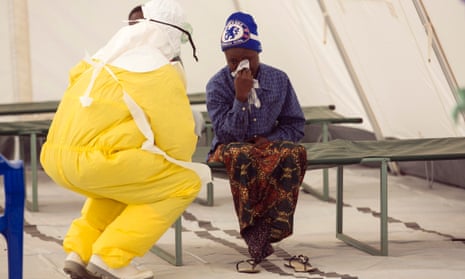“It’s a constant challenge,” says Sophie Madden. As a communications officer at Medecin sans Frontieres she has had plenty of experience of the delicate relationship between journalists and NGOs.
She spent much of 2014 trying to get journalists to cover Ebola. “We were talking about Ebola for quite some time before any journalists were aware of it,” she recalls.
Press releases were issued, journalists were offered interviews, but few reporters took the bait. As Madden explains, a combination of factors including the risk of deploying reporters to a far away country dealing with a mysterious deadly virus, meant editors were reluctant to cover the story.
That all changed last August, by which time the virus had killed more than 1,000 people, and MSF doctors in Liberia were being forced to turn away dying patients as treatment centres were full.
“One factor in the growing media interest was probably when the World Health Organisation finally admitted that the Ebola outbreak had reached crisis levels. But tellingly, a critical moment was when westerners started to get infected,” argues Madden. “Once stories began to emerge about western missionaries, doctors or nurses contracting the virus, media interest really picked up.”
A report published yesterday detailed the increasing tendency of some parts of the British media to look critically at NGOs and their work. It pointed to the need for greater scrutiny of the sector, as well as greater honesty within it, and included some highly critical comments from journalists describing development aid as an “old-fashioned, simplistic model”.
But some within the sector point out in response that although journalists can play a critical role in getting important stories to the public, they themselves are not always the easiest or most sensitive people to work with. “Never ask me to find you a ‘young raped girl but, you know, one who looks OK. Under 15 please’”, tweeted one press officer. Another commenter remembers being in the middle of a field emergency with a journalist barking: “Hurry up, I’ve got a deadline to catch!”
The difficulty of snagging media interest, as described by Madden, is a problem right across the board. Ben Parker, the co-founder and CEO of Irin, an independent humanitarian news organisation, says he is tired of dealing with a news agenda that ranks one disaster over another. “Why is the avoidable death of children not interesting?” he asks.
“If you think you’re a journalist and you can’t make Syria interesting, that’s your problem. There is compassion fatigue, but with the right access, contacts and journalistic skills you can get over that.”
Another criticism is that the picture painted by both sides is far too simplistic. The media get it wrong, say some: “A lot of the media’s reporting on aid and development seems to swing between two extremes of ‘this money is being wasted and should be stopped’ to ‘this money is being spent in a way that is doing wonders for grateful people in recipient countries’, with very little room in between for the more nuanced analysis that’s needed,” pointed out Kevin Smith, press officer for Global Justice Now.
But it’s also the responsibility of NGOs to get those stories across well, points out Mayur Paul of Bond, the membership body for UK development organisations. “In my view, it is up to the charities to find a way to make our stories more interesting. As a sector, we are one of the most transparent, accountable and dare I say most-obsessed with self-improvement. If ever there was a market for self-help books we’d be it.” Simon O’Connell, the executive director of Mercy Corps Europe, states that “both NGOs and journalists have been guilty of an overly-simplistic portrayal of people who are caught in crisis or poverty and both groups need to get better at telling that story”.
Richard Darlington, former special adviser at DfID, says: “International NGOs are not the only organisations to have a dysfunctional relationship with the British media, but they can find themselves at the crossroads of a toxic mix of cynicism about Westminster politics and overseas aid. It is incumbent on them to change this through better strategic communication, and to not act like victims.”
It’s been pointed out that although the media may demand more transparency, they are also one of the reasons that some organisations resist it. “There’s a real fear of things being taken out of context,” says a development worker.
But one press officer says the increased media scrutiny of the sector is good because it proves that NGOs are professional and equal to any large organisation in the private or public sector. He says: “Scrutiny should be positively welcomed. If the public sees us being scrutinised that will shift how we are seen.”
Above all, journalists are seen as potentially vital allies in getting the issues across to the public. Esther Agbarakwe of the Association for Reproductive & Family Health, points out that “journalists are key to any successful intervention. Journalists don’t only ‘question’ the relevance of an intervention by an NGO, but they also provide an opportunity to communities to understand and be informed about what has been provided as an intervention”. As Leah Oatway, senior communications officer at Action Against Hunger, says: “We need the media, in its fourth estate role, to share messages on important issues or crises that are under-reported and require international support, to encourage world leaders to make positive commitments to alleviate poverty, and to hold them accountable for those commitments.”
What do you think? Leave your thoughts in the comments below.
Join our community of development professionals and humanitarians. Follow@GuardianGDP on Twitter.

Comments (…)
Sign in or create your Guardian account to join the discussion